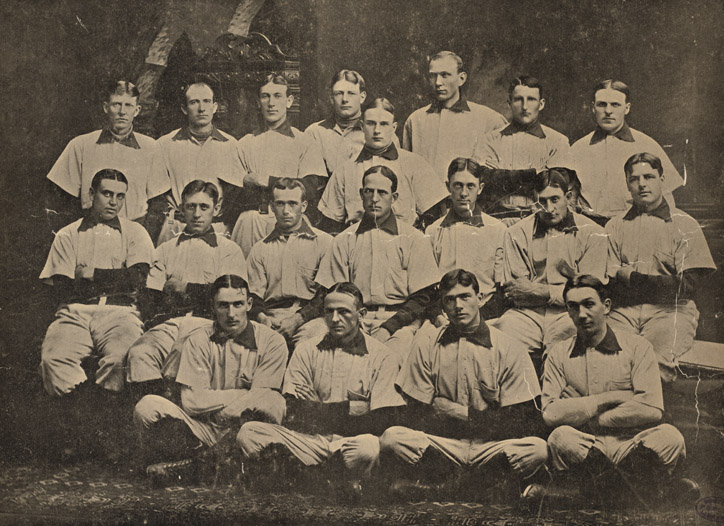Priam was first to note him as he scoured the plain, all radiant as the star which men call Orion's Hound, and whose beams blaze forth in time of harvest more brilliantly than those of any other that shines by night; brightest of them all though he be, he yet bodes ill for mortals, for he brings fire and fever in his train- even so did Achilles' armour gleam on his breast as he sped onwards.
Samuel Butler’s translation, from classics.mit.eduIt’s a baseball truism that the Dog Days of summer are the time the long seasonal narrative begins to take a coherent shape, beyond all the digressions into myths & extended similes. It’s the time when strange & vaguely mythic formulas like Pythagorean Expectations begin to overtake teams. It’s the time when individual statistics like the comically-named but crucially evaluative BABIP begin to charge to the fore like wrathful Achilles to bring reckoning on all those batters & pitchers who to date have cheated fate.
Each year brings us a surprise team, & with apologies to the Baltimore Orioles & the Oakland A’s, the surprise team (in terms of exceeding expectations) has been the Pittsburgh Pirates. One of baseball’s oldest franchises, the Pirates’ history goes back to the 19th century. Along the way, so of baseball’s most renowned & even legendary players were Pirates for all or at least significant parts of their career: Honus Wagner; Pie Traynor; Ralph Kiner; Roberto Clemente; Willie Stargell; Barry Bonds. But this season we have the pleasure of savoring the Pirates’ ascension into the pennant race—as of this writing they are holding second place in the National League Central Division, only four and a half games behind the Cincinnati Reds (who they are playing this very weekend), but also with a tenuous three & a half game lead on the mighty St Louis Cardinals, reigning World Series champions & by the Pythagorean Expectation formula the best team in the National League, if not in all baseball—but the real won-lost record doesn’t yet reflect that. & certainly Pittsburgh’s fans have endured a famine: their last playoff appearance & last season with a winning record was 1992, the final year Barry Bonds played there before moving on to San Francisco.

But not only can we savor this rare & strange story of the team’s apparent reversal of fortunes—we can also savor the story of the young star who has done so much to bring the reversal about: centerfielder Andrew McCutchen, who is in the midst of a statistically phenomenal season: thru the game on Friday August 3, he’s put up a .373/.433/.630 to go with 22 home runs & 14 stolen bases (the latter figure is a secondary story in itself, because the last time he stole a base was in June, which is a bit puzzling, but more on that in a bit.) McCutchen was named the National League’s “Player of the month for both June & July.
How much can a single player carry a team? How many wins can he himself by sheer force of his talent & skills, add to their total? The Sabermetric folks have come up with a rather complex calculation to determine this, which they call WAR—“wins above replacement player.” I’m not thrilled with the acronym, but the formula does yield thought-provoking results & whether or not it’s the evaluative baseball metric par excellence that some claim (I neither claim that it is or isn’t—that’s beyond my scope), it is at the very least a useful measure & one that should be brought to bear in evaluating players.
By the WAR metric, Andrew McCutchen has been worth 6 wins above the mythical “replacement level player”—the Wikipedia entry defines this as “a minor league/bench player at that position.” By that figure, with this fictional player as opposed to McCutcheon in place, the Pirates record would fall from 60-45 to 54-51; this would drop them into third place in their division, three games behind the Cardinals & 10 & a half behind Cincinnati. Whereas their current record would qualify them for the playoffs as a wild card team (the two teams in each league with the best record other than the division winners), they would fall behind four teams in that race as well.
So Andrew McCutchen is indeed heroic in baseball terms, & if his Pittsburgh team is too much the underdog to qualify as the Greeks in this particular Iliadic pennant race, he can certainly take the part of Achilles in leading them on & inspiring them; & fortunately as it would appear, not the brooding & resentful Achilles of the epic’s first part. McCutchen plays the game with elan & a focused intensity, a skilled & extremely athletic player in a game that's dependent on very particular skills like hand/eye coordination, sometimes to the exclusion of more strict athleticism. But McCutchen has those skills too, & appears in addition to be a good student of the game; a heady & heads-up player indeed.
 But there’s another Sabermetric principle: regression to the mean. I alluded to this earlier when I brought up “batting average on balls in play.” Tho McCutchen’s age means he’s at a stage of athletic development that could include a quantum leap in skill level—the mid to late 20s being considered the great years for skill in baseball—it’s also true that while a was very good player prior to this year, he hasn’t in three prior big league seasons wrecked this much statistical carnage. In 108 games he 2009, he batted .286/.365/.471 with 12 home runs & 22 steals; in full seasons in 2010 & 2011 his stats read as follows: .286/.365/.449, 16 HR, 33 steals; .259/.364/.456, 23 HR, 23 steals. These are the statistics of a very, very good ballplayer, make no mistake; they are not the statistics of an unquestioned superstar, which McCutchen appears to have become. Interestingly, his WAR figure for 2011 was not that much lower than this year’s (5.3 to 5.9), but that statistic digests many figures, not simply the basic ones I’m quoting; & it puts a high value on defense (as it should), & McCutchen is a very good fielder at a crucial position.
But there’s another Sabermetric principle: regression to the mean. I alluded to this earlier when I brought up “batting average on balls in play.” Tho McCutchen’s age means he’s at a stage of athletic development that could include a quantum leap in skill level—the mid to late 20s being considered the great years for skill in baseball—it’s also true that while a was very good player prior to this year, he hasn’t in three prior big league seasons wrecked this much statistical carnage. In 108 games he 2009, he batted .286/.365/.471 with 12 home runs & 22 steals; in full seasons in 2010 & 2011 his stats read as follows: .286/.365/.449, 16 HR, 33 steals; .259/.364/.456, 23 HR, 23 steals. These are the statistics of a very, very good ballplayer, make no mistake; they are not the statistics of an unquestioned superstar, which McCutchen appears to have become. Interestingly, his WAR figure for 2011 was not that much lower than this year’s (5.3 to 5.9), but that statistic digests many figures, not simply the basic ones I’m quoting; & it puts a high value on defense (as it should), & McCutchen is a very good fielder at a crucial position.Regression to the mean, in a baseball context, suggests that a player will at some point “normalize” in terms of performance & statistics to a group of players of similar talent & ability. Although “regression” has a negative connotation, it doesn’t necessarily mean that a player will “get worse”—he may improve his statistics & performance to be more in line with expectations & similar players.
 A .373 batting average is very high; in fact all three numbers in McCutchen’s “slash line” are high—not out of reach, not figures that a very select group of players can’t achieve in a given year, but high indeed. Given that expectations have been high for McCutchen & given that his age would indicate a high probability of a “breakout year,” we may simply decide that this year's player is the true McCutchen—unlike others who compiled gaudy statistics in the season’s first half, he won’t wilt in the Dog Days. In fact, speaking personally, this would be my preference. Because of my great attachment to Roberto Clemente when I was young, the Pirates have always been a favorite team of mine; & while they aren’t my main rooting interest (the Giants are), I like to see them do well. & McCutchen seems like the kind of player who could truly be generational, & that always exciting. In addition, on a rather silly & trivial note, I have him on my fantasy baseball team. This fact has also brought me some hours of happiness.
A .373 batting average is very high; in fact all three numbers in McCutchen’s “slash line” are high—not out of reach, not figures that a very select group of players can’t achieve in a given year, but high indeed. Given that expectations have been high for McCutchen & given that his age would indicate a high probability of a “breakout year,” we may simply decide that this year's player is the true McCutchen—unlike others who compiled gaudy statistics in the season’s first half, he won’t wilt in the Dog Days. In fact, speaking personally, this would be my preference. Because of my great attachment to Roberto Clemente when I was young, the Pirates have always been a favorite team of mine; & while they aren’t my main rooting interest (the Giants are), I like to see them do well. & McCutchen seems like the kind of player who could truly be generational, & that always exciting. In addition, on a rather silly & trivial note, I have him on my fantasy baseball team. This fact has also brought me some hours of happiness.But no stolen bases in over a month; only one home run in his last 15 games; only one RBI in his last 13. & this weekend, facing off against the formidable Cincinnati Reds in their home ballpark in a series that could begin to tell whether the Pirates themselves, even if not McCutchen personally, will survive the Dog Days as an contending team. Meanwhile, the “sleeping giant” St Louis Cardinals have won seven of their last 10 games…
These are the stories today, as I type with the fan humming in the background & the heat coming from each wall & window—even in moderate Portland. The Dog Days, when baseball gets Sirius.
All images link to their source
Sirius A & B photographed by the Hubbel Telescope; from Wiki Commons; in the public domain
1903 Pittsburgh Pirates-Honus Wagner is second to the right, second row; from Wiki Commons; public domain
Andrew McCutchen by Keith Allison on Flickr; from Wiki Commons & licensed under the Creative Commons Attribution-Share Alike 2.0 Generic license.
Black figure amphora depicting Achilles & Memnon, c. 520 BC; photo by Wiki Commons User Bibi Saint-Pol, who has released the image into the public domain
Andre McCutchen by Wiki Commons user
Shaun Ganley on Picasa Web Album; This file is licensed under the Creative Commons Attribution-Share Alike 3.0 Unported license.
First page from Immanuel Bekker's 1837 edition of Aristotle's Physics. Relevance? Aristotle is just one of many Classical authors who referred to the Dog Days.
An X-ray image of the Sirius star system located 8.6 light years from Earth, from Wiki Commons. NASA file, in the public domain




No comments:
Post a Comment
Comments are moderated, so please play nice!